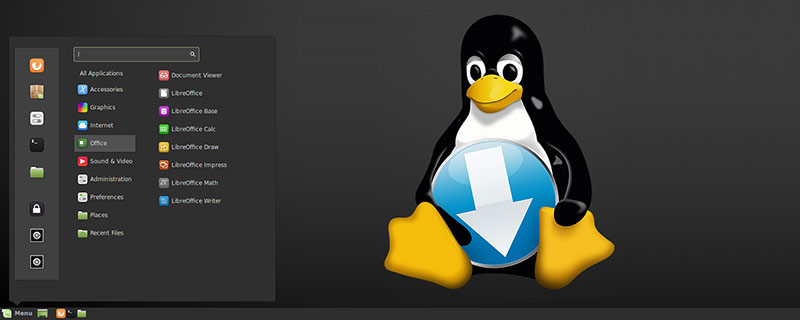How to learn linux
Many students have little exposure to Linux and know nothing about the development of the Linux platform. The current trend is increasingly showing that as an excellent software developer or computer IT industry practitioner, mastering Linux is a very important resource and means of making a living. But how to learn? How to study correctly and effectively? Let's talk about how to learn Linux better.

Getting started with Linux is very simple. The question is whether you have patience, whether you like to mess around, and whether you are not averse to overhauls such as reinstallation. It can be said that you can’t learn Linux well without struggling. Brother Niao said that you need to truly understand the partitioning mechanism of Linux and be quite proficient in using LVM. You cannot accumulate experience without more than 20 Linux installations, so don’t be afraid of struggling.
Since everyone has used Windows before, I try to take care of these "noobs" as much as possible. If you are new to Linux, try it first in Virtual Box. Virtual Box is very small. The installation package under the Windows platform is about 80MB, while the VM is often 600MB. Although it is powerful, it consumes a lot of resources, not to mention that Virtual Box can fully meet your needs.

As you can see, the Linux distribution is not Linux. Linux only refers to the kernel of the operating system. There are many Linux distributions. Here are some recommendations:
UBUNTU is suitable for developers who are pure novices, pursue stable official support, have weak requirements on system stability, like the latest applications, and are relatively less fond of fussing.
Debian is a much more difficult distribution than UBUNTU. Its outstanding feature is its stable and easy-to-use package management system. Its disadvantage is that it lacks enterprise support and is driven by community development.
Arch is the first choice for developers who pursue fashion. The advantage is that package updates are very fast and seamless upgrades. Once installed, it can basically run forever. There is no version concept like UBUNTU. Professionally speaking, it is called rolling upgrade. , keep your system up to date. The disadvantage is obviously easy to see and unstable. At the same time, the installation and configuration is more troublesome than Debian.
CentOS, a replica version of RedHat maintained by the community, is completely recompiled and generated using RedHat source code. The compatibility with RedHat is the best in theory. If you focus on Linux servers, such as network management and website establishment, then CentOS is your choice.
LFS, the ultimate hacker showoff tool, is completely installed and compiled from source code. All you get before installation is a document. All you have to do is follow the instructions in the document, step by step, command by command, and package by package. It is completely under your control. You can get whatever you want. . If you make LFS, it proves that your Linux skills are quite good. If you can learn and use LFS documents, and then transplant Linux from source code to embedded systems, I dare say that you can do well in Chinese companies. good.
The following is the way to learn. It is not worth it to go to training and register for classes. The training fees are very high nowadays. In today's era of expanding information resources, there are many online resources. We can completely use the Internet. The most important thing is how to find good resources. , carry out correct study.
Here are some more recommended learning videos and materials:
The understanding of things is generally a process from the shallower to the deeper, from the outside to the inside, and it can only be gradual. Learning Linux also requires a certain order and method. If you are a beginner, it is recommended to study carefully in the recommended order. Haste makes waste, and pulling out the seedlings may not necessarily help.
In addition, it is strongly recommended to take notes on reading, memorize while reading, and think while practicing. "Learning without thinking is a waste, thinking without learning is dangerous." What is more important than diligence is the ability to think. , don’t learn foolishly or blindly. Develop a good habit of reading. If you don’t regard study books as accumulation of knowledge, you will be reading them in vain. It may not be enough to read a book once. Only by reading it multiple times and practicing it repeatedly can it make a deep impression. Practice is the only criterion for testing truth, and practice brings true knowledge.
The method is there, the key is persistence. Set your own learning goals, set rewards and punishments, determine a detailed time schedule, and start taking action! Maintain enthusiasm, firm goals, make plans, learn Linux well, and change your career destiny.
The above is the detailed content of How to learn linux. For more information, please follow other related articles on the PHP Chinese website!

Hot AI Tools

Undresser.AI Undress
AI-powered app for creating realistic nude photos

AI Clothes Remover
Online AI tool for removing clothes from photos.

Undress AI Tool
Undress images for free

Clothoff.io
AI clothes remover

AI Hentai Generator
Generate AI Hentai for free.

Hot Article

Hot Tools

Notepad++7.3.1
Easy-to-use and free code editor

SublimeText3 Chinese version
Chinese version, very easy to use

Zend Studio 13.0.1
Powerful PHP integrated development environment

Dreamweaver CS6
Visual web development tools

SublimeText3 Mac version
God-level code editing software (SublimeText3)

Hot Topics
 deepseek web version entrance deepseek official website entrance
Feb 19, 2025 pm 04:54 PM
deepseek web version entrance deepseek official website entrance
Feb 19, 2025 pm 04:54 PM
DeepSeek is a powerful intelligent search and analysis tool that provides two access methods: web version and official website. The web version is convenient and efficient, and can be used without installation; the official website provides comprehensive product information, download resources and support services. Whether individuals or corporate users, they can easily obtain and analyze massive data through DeepSeek to improve work efficiency, assist decision-making and promote innovation.
 How to install deepseek
Feb 19, 2025 pm 05:48 PM
How to install deepseek
Feb 19, 2025 pm 05:48 PM
There are many ways to install DeepSeek, including: compile from source (for experienced developers) using precompiled packages (for Windows users) using Docker containers (for most convenient, no need to worry about compatibility) No matter which method you choose, Please read the official documents carefully and prepare them fully to avoid unnecessary trouble.
 Ouyi okx installation package is directly included
Feb 21, 2025 pm 08:00 PM
Ouyi okx installation package is directly included
Feb 21, 2025 pm 08:00 PM
Ouyi OKX, the world's leading digital asset exchange, has now launched an official installation package to provide a safe and convenient trading experience. The OKX installation package of Ouyi does not need to be accessed through a browser. It can directly install independent applications on the device, creating a stable and efficient trading platform for users. The installation process is simple and easy to understand. Users only need to download the latest version of the installation package and follow the prompts to complete the installation step by step.
 BITGet official website installation (2025 beginner's guide)
Feb 21, 2025 pm 08:42 PM
BITGet official website installation (2025 beginner's guide)
Feb 21, 2025 pm 08:42 PM
BITGet is a cryptocurrency exchange that provides a variety of trading services including spot trading, contract trading and derivatives. Founded in 2018, the exchange is headquartered in Singapore and is committed to providing users with a safe and reliable trading platform. BITGet offers a variety of trading pairs, including BTC/USDT, ETH/USDT and XRP/USDT. Additionally, the exchange has a reputation for security and liquidity and offers a variety of features such as premium order types, leveraged trading and 24/7 customer support.
 Get the gate.io installation package for free
Feb 21, 2025 pm 08:21 PM
Get the gate.io installation package for free
Feb 21, 2025 pm 08:21 PM
Gate.io is a popular cryptocurrency exchange that users can use by downloading its installation package and installing it on their devices. The steps to obtain the installation package are as follows: Visit the official website of Gate.io, click "Download", select the corresponding operating system (Windows, Mac or Linux), and download the installation package to your computer. It is recommended to temporarily disable antivirus software or firewall during installation to ensure smooth installation. After completion, the user needs to create a Gate.io account to start using it.
 Ouyi Exchange Download Official Portal
Feb 21, 2025 pm 07:51 PM
Ouyi Exchange Download Official Portal
Feb 21, 2025 pm 07:51 PM
Ouyi, also known as OKX, is a world-leading cryptocurrency trading platform. The article provides a download portal for Ouyi's official installation package, which facilitates users to install Ouyi client on different devices. This installation package supports Windows, Mac, Android and iOS systems. Users can choose the corresponding version to download according to their device type. After the installation is completed, users can register or log in to the Ouyi account, start trading cryptocurrencies and enjoy other services provided by the platform.
 Why does an error occur when installing an extension using PECL in a Docker environment? How to solve it?
Apr 01, 2025 pm 03:06 PM
Why does an error occur when installing an extension using PECL in a Docker environment? How to solve it?
Apr 01, 2025 pm 03:06 PM
Causes and solutions for errors when using PECL to install extensions in Docker environment When using Docker environment, we often encounter some headaches...
 How to automatically set permissions of unixsocket after system restart?
Mar 31, 2025 pm 11:54 PM
How to automatically set permissions of unixsocket after system restart?
Mar 31, 2025 pm 11:54 PM
How to automatically set the permissions of unixsocket after the system restarts. Every time the system restarts, we need to execute the following command to modify the permissions of unixsocket: sudo...






